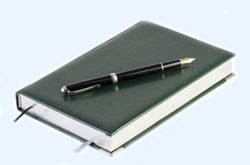Writing Therapy
“Putting your innermost thoughts to paper releases intense feelings including guilt, sadness, or anger– emotions that can impede your body’s ability to heal” – Joshua Smyth, Ph.D.
 Overview
Overview
Few tools expose us to the inner workings of our mind and body like the simple act of writing. By jotting down one’s thoughts and feelings freely in a journal, a form of release is achieved as the body and brain no longer have to hold onto the emotions carried through words. Everyone needs a creative outlet. A daily practice of journaling could be the outlet that helps your spirit shine.
Health Benefits of Journaling / Writing
- Personal Empowerment – journaling teaches us “We have the wisdom for all we need inside of us.” – Anne L. Day
- Pain & Emotional Relief – In regards to arthritis, “If the symptoms are related to repressed emotions, once the mind develops insight into this relationship, the body no longer needs to ask for attention and symptoms improve.” –David Rakel & Daniel Muller
- Mental Clarity – It helps to “strengthen intuition and guidance.” It also “opens the door to hear the inner voice and records the guidance.” “It also provides a picture of the hidden gifts of an illness or accident.” – Anne L. Day
Writing as a form of release has been shown to improve immune function and decrease the stress response, making it a helpful treatment for many chronic illnesses including IBS, fibromyalgia, HIV, arthritis, and more.
Writing Exercise for Letting Go
Editor’s Note: “I sometimes dread having to write in my journal because it is such a mirror of what is going on in my life, and sometimes I’d rather not face reality. But, if we don’t face things as they come, we suppress them, and they ultimately come back with greater force (almost a vengeance).” Here are some exercises to help you release difficult emotions:
- The Expressive Writing Method – follow this video from Professor James Pennebaker [www.youtube.com/watch?v=XsHIV9PxAV4] to release traumas through personal expression.
- Give Things a Positive Spin – for the most part writing as a release can be done completely free form with very little restrictions. However, it is best to reflect on your writing and try to put a positive spin on what you have written. That helps you to resolve any negative feelings that arise, since venting can often make us feel worse if it is not followed by efforts toward gratitude an positive thinking
- Destroy The Evidence – some of the keys of writing as a form of release are to be honest, specific and to not worry at all about grammar or whether or not someone will read your words. One of the best ways to resolve any fears you have about being totally unrestricted with your expression is to destroy the evidence. You can shred or burn the pages after a 30 minute writing session so that you feel completely free. You can even make this action part of a regular ritual of letting go timed with the occurrence of a full moon.
For additional tools and writing suggestions please see the resources that follow.
Journaling Resources
Emotional and physical health benefits of expressive writing – http://apt.rcpsych.org/content/11/5/338.full?sid=7b61fc4f-2a43-4597-a546-4581a67a0507 – a full text research article including the basics for writing exercises, along with the effects.
‘Expressive Writing’ Is A Super Easy Way To Become Way Happier – http://www.businessinsider.com/the-positive-effects-of-journaling-and-expressive-writing-2014-5#ixzz34p7kqflD – Business Insider article by Drake Baer.
The Health Benefits of Journaling – http://psychcentral.com/lib/2006/the-health-benefits-of-journaling/ – an article by Maud Purcell, LCSW, CEAP outlining the benefits of journaling. *The site PsychCentral.com is funded by advertising, but offers great information on mental health concerns.
Inspired to Journal – http://inspiredtojournal.net/ – a simple site with journaling tips and prompts.
The Write Way to Wellness – www.kripalu.org/article/836/ – an article describing the 10 ways writing aids health along with helpful suggestions for writing exercises.
Writing and Health – http://homepage.psy.utexas.edu/homepage/Faculty/Pennebaker/Home2000/WritingandHealth.html a web page from James W. Pennebaker, author and expert.
Writing Therapy – Wikipedia – http://en.wikipedia.org/wiki/Writing_therapy
Your Write to Health – Psychology Today – http://www.psychologytoday.com/blog/your-write-health – a blog by Martha Peaslee Levine, M.D. focused on writing techniques for “self-discovery, self-acceptance, and improved self-confidence.”
References:
Diana S. Boehnert, MFA. Lecture at The Graduate Institute, November 11 & 12, 2011. An Expressive Art Experience
Anne L. Day, MA, RN, CMT, HNC, CHTP/I. The Journal as a Guide for the Healing Journey. Holistic Nursing Care. March 2001. pgs 131-141.
Rakel, D., Muller, D. (2004). Chapter 29: Integrative Approach to Rheumatology in Integrative Medicine. McGraw Hill Companies.
Smyth, J.M., Pennebaker J.W. Exploring the boundary conditions of expressive writing: In search of the right recipe. British Journal of Health Psychology November 21, 2007.
Spencer, R. Write and heal: to reduce stress and find inner peace, sharpen a pencil and start writing.Natural Health. Feb 2009 v39 i2.
[Last Updated: 6/16/14]


Comments are closed.